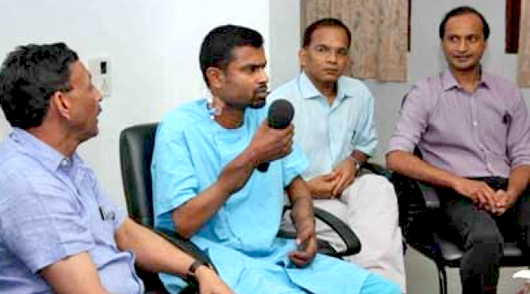The American pharmaceutical giant Pfizer Inc. and the European biotechnology company BioNTech SE have conducted an experimental trial of a COVID-19 vaccine candidate and found it to be safe, well-tolerated, and capable of generating antibodies in the patients.
The study, which is yet to be peer-reviewed, describes the preliminary clinical data for the candidate vaccine -- nucleoside-modified messenger RNA (modRNA), BNT162b1.
It said the amount of antibodies produced in participants after they received two shots of the vaccine candidate was greater than that reported in patients receiving convalescent plasma from recovered COVID-19 patients.
"I was glad to see Pfizer put up their phase 1 trial data today. Virus neutralizing antibody titers achieved after two doses are greater than convalescent antibody titers," tweeted Peter Hotez, a vaccine scientist from Baylor College of Medicine in the US, who was unrelated to the study.
Researchers, including those from New York University in the US, who were involved in the study, said the candidate vaccine enables human cells to produce an optimised version of the receptor binding domain (RBD) antigen -- a part of the spike (S) protein of SARS-CoV-2 which it uses to gain entry into human cells.
"Robust immunogenicity was observed after vaccination with BNT162b1," the scientists noted in the study.
They said the program is evaluating at least four experimental vaccines, each of which represents a unique combination of mRNA format and target component of the novel coronavirus, SARS-CoV-2.
Based on the study's findings, they said BNT162b1 could be administered in a quantity that was well tolerated, potentially generating a dose dependent production of immune system molecules in the patients.
The research noted that patients treated with the vaccine candidate produced nearly 1.8 to 2.8 fold greater levels of RBD-binding antibodies that could neutralise SARS-CoV-2.
"We are encouraged by the clinical data of BNT162b1, one of four mRNA constructs we are evaluating clinically, and for which we have positive, preliminary, topline findings," said Kathrin U. Jansen, study co-author and Senior Vice President and Head of Vaccine Research & Development, Pfizer.
"We look forward to publishing our clinical data in a peer-reviewed journal as quickly as possible," Jansen said.
According to Ugur Sahin, CEO and Co-founder of BioNTech, and another co-author of the study, the preliminary data are encouraging as they provide an initial signal that BNT162b1 is able to produce neutralising antibody responses in humans.
He said the immune response observed in the patients treated with the experimental vaccine are at, or above, the levels observed from convalescent sera, adding that it does so at "relatively low dose levels."
"We look forward to providing further data updates on BNT162b1," Sahin said.
According to a statement from Pfizer, the initial part of the study included 45 healthy adults 18 to 55 years of age.
It said the priliminary data for BNT162b1 was evaluated in 24 subjects who received two injections of 10 microgrammes ( g) and 30 g -- 12 subjects who received a single injection of 100 g, and 9 subjects who received two doses of a dummy vaccine.
The study noted that participants received two doses, 21 days apart, of placebo, 10 g or 30 g of BNT162b1, or received a single dose of 100 g of the vaccine candidate.
According to the scientists, the highest neutralising concentrations of antibodies were observed seven days after the second dose of 10 g, or 30 g on day 28 after vaccination.
They said the neutralising concentrations were 1.8- and 2.8-times that observed in a panel of 38 blood samples from people who had contracted the virus.
In all 24 subjects who received two vaccinations at 10 g and 30 g dose levels, elevation of RBD-binding antibody concentrations was observed after the second injection, the study noted.
It said these concentrations are 8- and 46.3-times the concentration seen in a panel of 38 blood samples from those infected with the novel coronavirus.
At the 10 g or 30 g dose levels, the scientists said adverse reactions, including low grade fever, were more common after the second dose than the first dose.
According to Pfizer, local reactions and systemic events after injection with 10 g and 30 g of BNT162b1 were "dose-dependent, generally mild to moderate, and transient."
It said the most commonly reported local reaction was injection site pain, which was mild to moderate, except in one of 12 subjects who received a 100 g dose, which was severe.
The study noted that there was no serious adverse events reported by the patients.
Citing the limitations of the research, the scientists said the immunity generated in the participants in the form of the T cells and B cells of their immune system, and the level of immunity needed to protect one from COVID-19 are unknown.
With these preliminary data, along with additional data being generated, Pfizer noted in the statement that the two companies will determine a dose level, and select among multiple vaccine candidates to seek to progress to a large, global safety and efficacy trial, which may involve up to 30,000 healthy participants if regulatory approval to proceed is received.






Comments
Wow that was unusual. I just wrote an extremely long commment butt after I
clickerd submit my comment didn't appear. Grrrr...
well I'm not writing all that over again. Anyways, jusst wanted to ssay excellent blog!
Look into my page ... auta: http://gerbile.pl/forum/profile.php?mode=viewprofile&u=10860
Add new comment